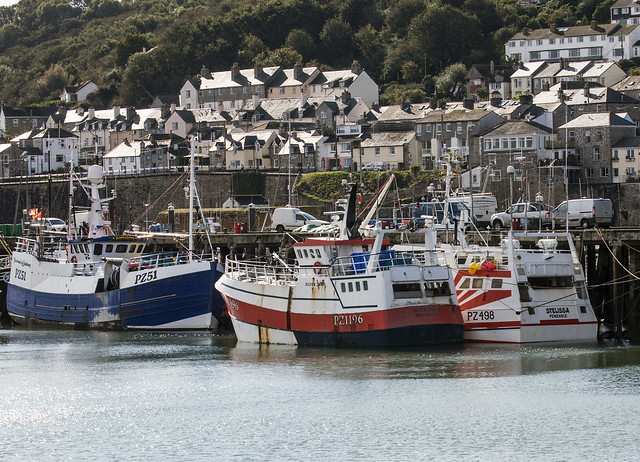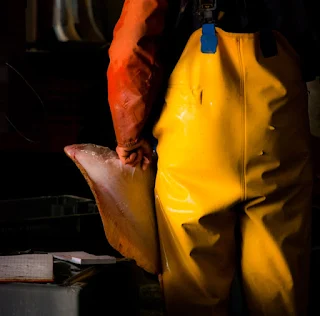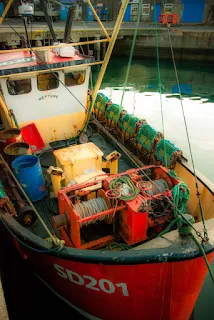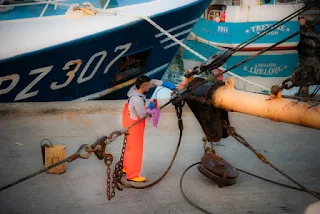Cornish hake is MSC certified as sustainable!
It's smiles all round from the boys who catch hake!
After years of seeing South African hake on the wet fish counters of supermarkets throughout the UK despite fishermen seeing an abundance in our own waters
Local speciality fish, Cornish hake, has achieved Marine Stewardship Council (MSC) certification as a sustainable and well-managed fishery. This latest recognition means that, subject to strict traceability requirements, Cornish hake can be branded with the widely-recognised blue fish ecolabel.
A sustainable success
Cornish hake has been a popular species for many years, but the stock was left slightly depleted in the late 1990s. Now, thanks to sacrifices by fishermen and a new management plan set up in 2001, hake stocks have recovered to nearly double their low point.
One of the fishery’s key strengths is the use of nets with larger mesh size than the legal requirement. These nets only target the larger hake fish and allow the smaller, juvenile fish to swim free, leaving more fish to reproduce.
A local fishery and interesting species
Cornish fishermen work from a fleet of 15 boats catching hake in the Celtic Sea to the west of the UK mainland and south of Ireland. Together they land just under 1,000 tonnes of European hake (Merluccius merluccius) per year into Newlyn, Cornwall from the boats, which range from 12 metres to nearly 23 metres long.
European hake are found along the continental shelf and the shelf slope in the north-eastern Atlantic from northern Norway and Iceland south to Mauritania. They normally live at depths of 100-300 m from Ireland south to Gibraltar and in the Mediterranean Sea.
 |
| In the fishroom, Cornsih hake are carefully boxed and iced at +2ºC |
The main market for Cornish hake is in Europe, particularly Spain, France & the UK. Fish are sold as fresh, whole, gutted fillets and steaks into retail and restaurants.
Laky Zervudachi, Sustainability Director of seafood specialists Direct Seafoods welcomed the certification: “Direct Seafoods are really excited at the recent news that Cornish hake is due to receive its MSC certification. This will be a great opportunity for us to promote a local UK sourced fish that is available in significant volumes and tastes delicious. This certification will have a significant impact in raising public awareness in the MSC, as it highlights a truly local fish that is readily available and has been growing in popularity with chefs up and down the country.”
Claire Pescod, UK Fisheries Outreach Manager, said: “This is excellent news that Cornish hake has achieved MSC certification. They have put in a lot of hard work and it is great that their long-standing efforts have been officially recognised. I’m delighted that there is another certified British species to help meet consumer demand for sustainable seafood – Cornish hake is a fantastic British species and we’re already seeing interest from restaurants who want to add MSC hake to their menu.”
Retail support
The Co-operative Group set up a £200,000 fund to help support fisheries complete the Marine Stewardship Council (MSC) certification process in 2010. The Cornish gill-net hake fishery is the fourth fishery in the south west to be supported through the MSC assessment process by the retailer and is the first to gain MSC certification.
Stuart Smith, Technical Manager with The Co-operative Food, said: “We are pleased to hear that the Cornish hake fishery has achieved MSC certification and we will be reviewing opportunities to use MSC certified Cornish hake in our seafood range.
“Our key principles are supported by MSC certification. They include a fully traceable seafood supply chain, independent evaluation and certification to internationally recognised standards, a commitment to continuous improvement to meet with future requirements, and to be flexible to changes in scientific advice.”
Industry rising to the challenge
“We are proud of how the industry has responded to the challenge of working with scientists to better understand the state of fish stocks and where action has been needed to improve stocks it has been taken. What better way to demonstrate that than going through MSC assessment“, said Paul Trebilcock, CEO of the Cornish Fish Producers Organisation (CFPO), which is leading the move for certification.
The CFPO was established in 1976 as a non-profit making co-operative, and today consists of 210 fishing vessel-owning members from all over Cornwall. It represents the views of Cornish fishermen locally, nationally and internationally.
About Marine Stewardship Council (MSC)
The Marine Stewardship Council (MSC) is an international non-profit organization. Our vision is for the world’s oceans to be teeming with life, and seafood supplies safeguarded for this and future generations. Our ecolabel and certification program recognises and rewards sustainable fishing practices and is helping create a more sustainable seafood market.
The MSC ecolabel on a seafood product means that:
· It comes from a wild-catch fishery which has been independently certified to the MSC’s science-based standard for environmentally sustainable fishing.
· It’s fully traceable to a sustainable source.
More than 260 fisheries in over 30 countries are certified to the MSC’s Standard. These fisheries have a combined annual seafood production of almost nine million metric tonnes, representing close to 10% of annual global yields. More than 27,000 seafood products worldwide carry the MSC ecolabel.
For more information visitwww.msc.org
For more information visitwww.msc.org



















































